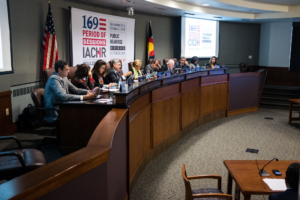What Exactly Is Happening in the Northern Triangle?

Latin America is in a vicious circle of crime, poverty and corruption. High crime rates thwart economic opportunities and crime rates push people into poverty, all cumulating into corrupt leaders who use the pain for their power and self-interest. Nevertheless, nowhere is crime more prevalent than in the Northern Triangle.
The Northern Triangle is region in Central America that includes Guatemala, Honduras and El Salvador. It has experienced the worst problems such as poor economic growth, rampant gang violence and political corruption. This three-prong nightmare has fueled an estimated 265,000 people toward the Southern U.S. Border and will continue to grow into the foreseeable future. While some do attempt to find safety in Europe and elsewhere in South America, others take the risk and traverse their way to the U.S-Mexico border, where they risk entering the country illegally. Others surrender to U.S. border patrol and seek asylum. However, it is unlikely that they will receive asylum. On average, only 13% of individuals receive asylum and experience integration into the United States.
Gang Corruption
In 2017, a survey asked the people in El Salvador, “who runs the country?” About 42% of respondents said “Delincuencia/Maras.” For non-Spanish speakers, this translates to gangs, like MS-13.
These answers have visible ramifications that strike at the core of the government. Governments in the Northern Triangle are weak, and the people know this; the gangs know this. People understand the country’s power lies in gangs’ hands, not in the government’s.
For example, in 2012, the Salvadorian government agreed to sign a truce with the criminal organizations to address skyrocketing homicide rates. The profoundly unpopular legislation did lower the homicide rate but the people still had to continue to pay gangs. Tactics like homicide and racketeering are not the only ways these organizations flex their might.
Throughout the Northern Triangle, gangs rely on drug and human trafficking, money laundering, kidnapping and theft to export their criminal enterprise well beyond the Northern Triangle. Issues in the Northern Triangle are not just an inter-state problem but also a problem for the entire Western Hemisphere.
Governance Problem
Northern Triangle nations have made some progress when it comes to corruption. But the total damage that such corruption caused is still in the billions: $13 billion to be precise.
In 2006, Guatemala successfully combated corruption when it appealed to the U.N., which established the International Commission Against Impunity in Guatemala (CICIG). This independent body investigates the infiltration of criminal groups within state institutions. Such an organization resulted in the conviction of hundreds of officials and reduced the homicide rate.
In El Salvador, in 2019, the country created its own independent body called Commission against Corruption and Impunity in El Salvador (CITIES), which could yield the same results as CICIG. Over in Honduras, the hopes of establishing such independent oversight do not seem to be gaining the same traction. After the resignation of President Lobo Sosa in 2013, an investigation into the Honduran Institute of Social Security revealed a scandal that cost the people over $200 million. It also implicated President Orlando Hernández, who admitted to unknowingly using some of the money to fund his presidential campaign.
A Path Forward
In Washington DC, support exists for CICIH and CITIES. Congresswoman Norma Torres and others released a statement in 2019 supporting these institutions. Reinstating the CICIG and implementing the same structure in CICIH and CITIES would stop corruption. This would allow the state to use its monopoly on violence to fight crime and allow positive economic growth. In April 2021, the State Department announced $740,740 in available funding for “competition for organizations interested in submitting applications for projects that empower civil society to combat corruption and protect human rights.”
– Diego Romero
Photo: Flickr
